Joe Wright’s historical biopic, The Darkest Hour, starring Gary Oldman as Winston Churchill in an Oscar-caliber performance, is released by Focus Features.
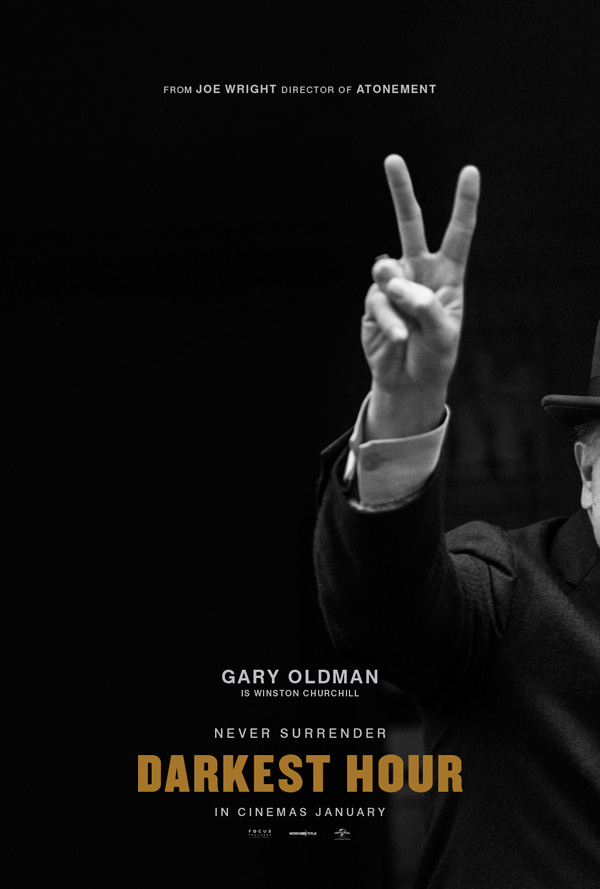
View of Winston Churchill
Gary Oldman: Well he is really incomparable. I guess you might liken him to Lincoln in that respect. We don’t know what kind of President Lincoln would have been in peace time because history decided that, but in my learning of Churchill, you are looking at a man who wrote 50 books, he wrote more words than Shakespeare put together, and he won the Nobel Prize for Literature. He painted 544 paintings and had 16 exhibitions in the Royal Academy, he was over 50 years in politics, he held almost every major position in politics, he was commended in four wars, the list goes on and on and on. He was a conservative, but he was also a liberal. He set up a lot of the sort of social safety nets that we now enjoy, t-boats for the workers, the employment exchange. So he was sort of such an extraordinary man that in learning about him, I was born in 1958, in Kindergarten and growing up, talking like the early 60s, he was very much, he was the man who won the war, he saved us from Nazi Germany. My mother actually caught a glimpse of him, my mother, God bless her, is still alive and she is 98 years old and remembers Churchill. My father fought under Churchill and he joined the Royal Navy in 1935 and he was in the Atlantic and my father also fought in the Battle of Okinawa and came back in late 1948. So you feel that connection to it. If you think of it, because my sons look at it and they are 18 and 20 and they look at this as sort of the mists of time, long, long ago. When I was born in 1958, it was only 12 years and you still felt in the air the Second World War, and where I grew up, there were like three houses and then a house missing. Four houses, two houses missing. So you still experienced the aftermath of the Blitz.
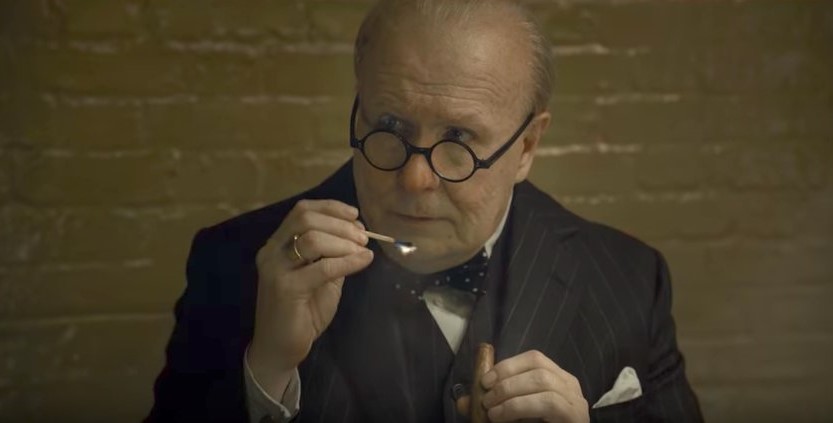
Churchill’s Vulnerability
GO: I think he was, the line that I have on the underground train when I say to the girl, she says are you crying? And I say I am a bit of a blubber and you’ll have to get used to it. I mean that was a line that we added because he actually said that. And he would go out to areas of London that had been bombed, he was out amongst the people, and he would often be moved to tears and he could cry over a cat or a puppy. But there’s a lovely little story which I think gives an insight to how soft he could be. The family were playing a game around the table one night, and it was game of who would you would be, that if you were not who you are, then who would you like to be? And it came to Winston, and he paused for effect, turned to Clementine and said, I would like to be Mrs. Churchill’s second husband. Which I think is a very, it speaks of their relationship and their marriage. I think that truly, he said many beautiful things, but that is I think truly a beautiful line.
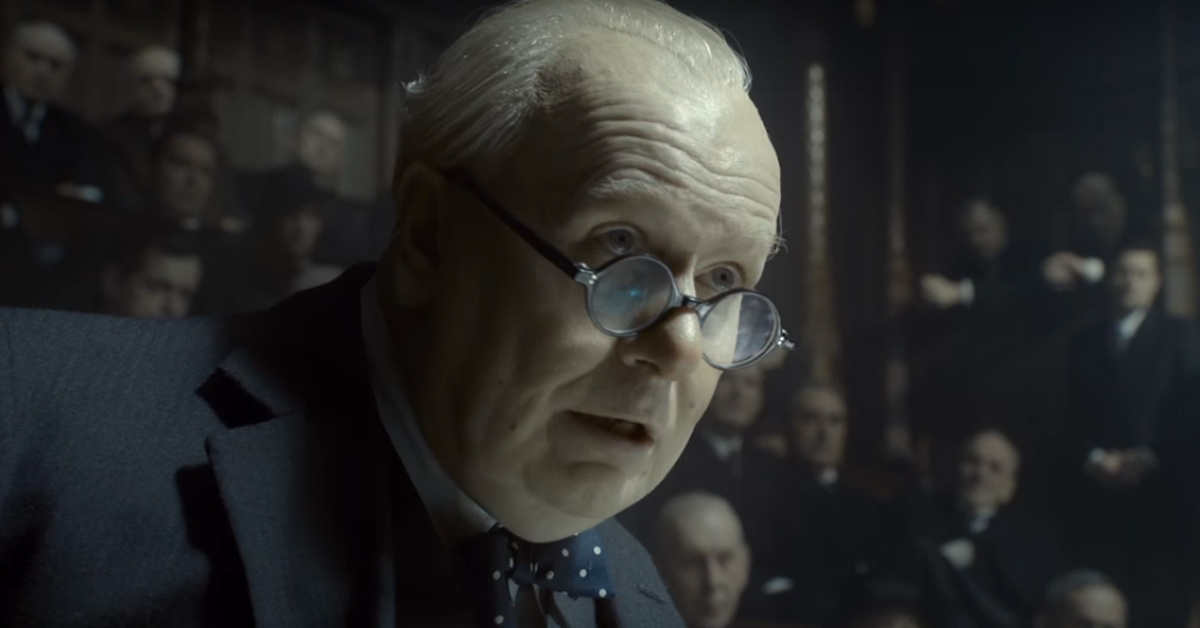
Preparation for Role
GO: All the things you would imagine. You go through the material, and it’s voluminous and you would need a whole other life just to read all the biographies and indeed his own work, which is 50 very large volumes. When I was asked to do it, initially I turned it down, because I thought what could I do that is new? You are not only asked to walk in the shoes of this great icon and arguably the greatest Britain who ever lived, but then you are walking in the shoes of Albert Finney and Robert Hardy and all these other people that have played him. But I would close my eyes and try to imagine Churchill and I wasn’t sure if I was imagining or whether I was sort of contaminated or influenced by the other people that have played him. And so I put that aside and went to the material, the reading material, but particularly the news footage of him. And he has been represented as a bit of curmudgeon, an old guy sort of shuffling around in a bad mood, smoking a cigar and chugging back a whiskey. And the Churchill that I saw, certainly in this time period of the footage, was this man who was dynamic, and he had a lust for life, and it was enjoying the position of responsibility he was in and he was marching ahead of everyone, moving through space with this fixity of purpose, this man on a mission. He did look like a baby and he had a cherubic round face with a real sparkle in his eye and a grin on his lips and that was somewhat of a revelation to me. You do think of this man who was 65 and who had led an extraordinary life up to that point and had successes and failures. But the dynamism of Churchill was there and it was also on the page. It was a Churchill that Anthony McCarten wanted to show. And then you just start trying to soak it all up like a sponge and the way he turns the pages, the way he uses his hands, the gestures, and the way he addresses a conference or a gathering. So you just try and take all these pieces. The character is a bit like putting on a new pair of shoes, it all feels a little uncomfortable at first and then you wear it in and then it almost becomes part of you.
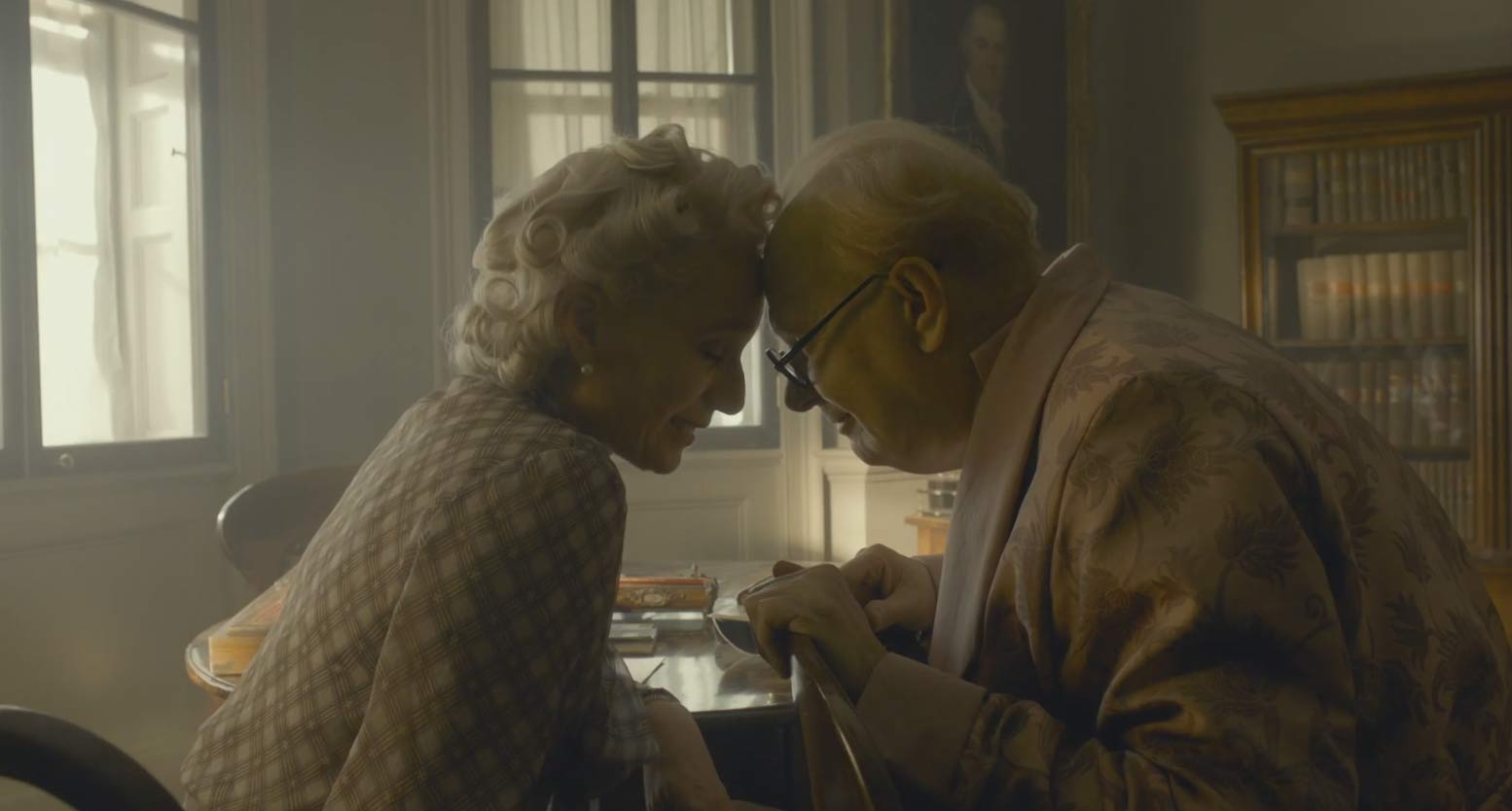
Playing Complex Character
GO: We were very fortunate to have behind the velvet ropes tours of all of these places. So we went to Blenheim where he was born and we went to Chartwell, and we had a tour of Downing Street. Obviously, we were in the war rooms and there’s a chair in the war room, in the actual war room as we show in the film, there’s a wooden chair with arms where he sat intermittently throughout the war, he wasn’t there the whole time. And I was allowed to sit in the great man’s chair. And what struck me was that on the left arm, were these huge divots that he had made with his fingernails, and on the right arm, were all the scratches from his ring. And that’s behavior from the stress, the enormous stress that he must have been under, but that is behavior that is actually now part of this piece of furniture. And that, just being there and feeling that and getting a sense of what that must have been like. I mean, you forget that he only had 300,000 and he almost lost them entirely in Dunkirk. Hitler had 5,000,000. And obviously I didn’t meet the man, I didn’t speak to the man, and I can read what I can read and get a sense of him through history and through the writing. But I can’t even imagine what kind of stress and anxiety that would give one. But he knew in his core, from the early 30s and he had been in Munich, he was a man who knew in his core, what the right thing to do was as we know, which was to eradicate Nazism and fascism. Thank heaven for him.
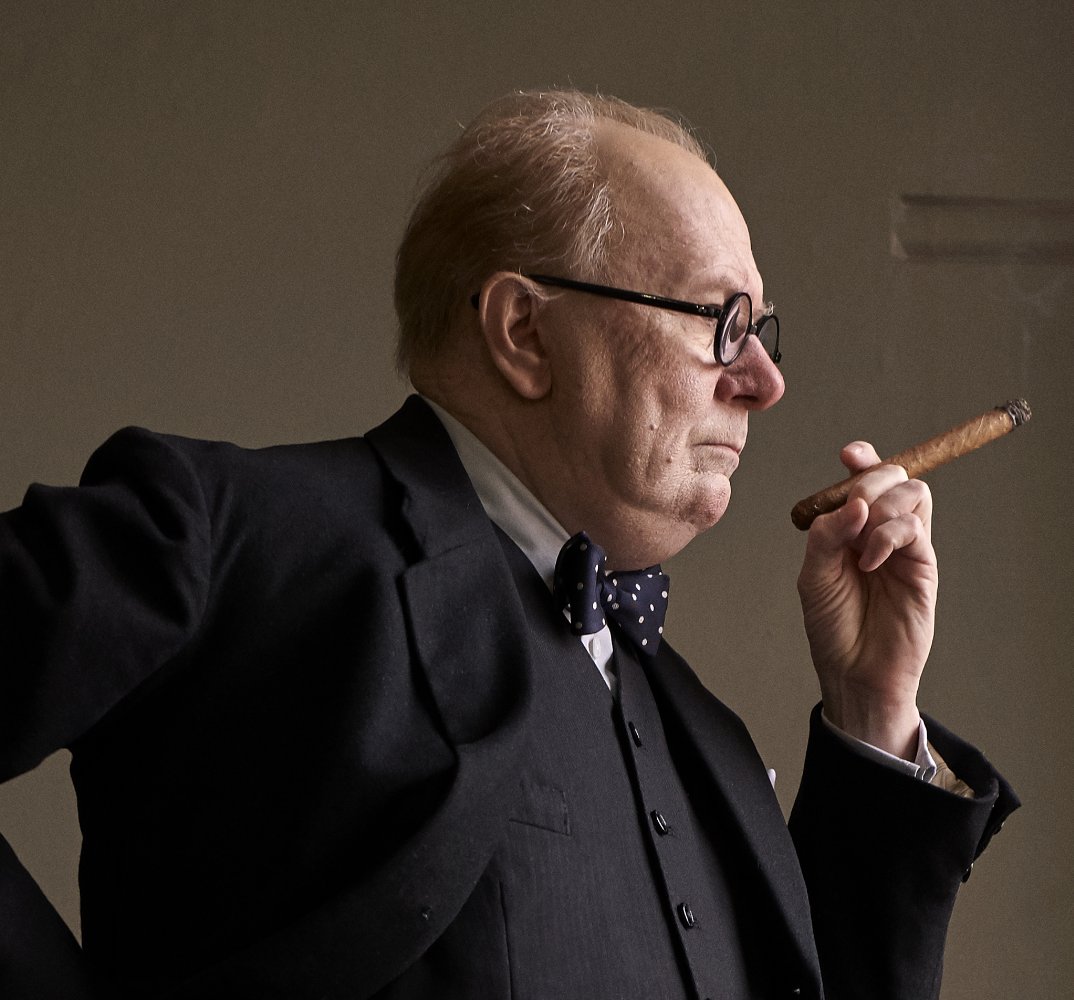
Misconception about Churchill
GO: Going back to his battle cry against Nazi Germany, I think after the First World War, it was inconceivable that there would be another war. It was as they said famously, it was the war to end all wars. And the cost of that war financially and the lives that were lost, was devastating, followed then by the crash. But the atmosphere, passivism, was universal. We all were war weary and we didn’t want it, we couldn’t even contemplate the idea. During the so-called “wilderness years” of Churchill, and he wrote a million words during those years, so he wasn’t quite so in the wilderness, he was pretty busy, he was researching his ancestor, the Duke of Marlborough, and went to Germany to visit the battlegrounds, particularly Blenheim. So just by chance, he happened to be in Germany and he was in Munich in 1932, almost met Hitler, but he didn’t meet Hitler, but he almost met him, but he could see what was happening on the streets. And as he later said, these young men in their brown shirts with hope in their eyes, he said, they are not looking for status, they are looking for weapons. So he got a real sense of Hitler and what was happening first hand. He then came back to England and stood up in Parliament and said Hitler is killing the Jews, and he is going to come here and he’s going to kill you. And as I say, it was an atmosphere of pacifism and he is coming back and saying, we need to rearm and that is the last thing that everybody was doing, except Hitler. But that was the last thing that everybody wanted. And he kept on with this battle cry of Hitler and it made him hugely unpopular. So we get this sort of man who wants war and is a war monger and is a scare monger and to many he was. Plus the fact that you have also, a lot of the aristocracy and even though he was part of that, he didn’t care for them very much, and they favored fascism over communism, because they thought that they were going to have all their land and all their money taken away. So there were a lot of people that were actually naively pro-Hitler at the time, and he was very much anti-Hitler. There probably are many, but I would imagine that that’s one of the misconceptions.

Courage to Take Part?
GO: My love for him, or my curiosity about him, my fascination, it doesn’t end here. I had just probably a little under a year to work on it and it was a year that I gave up to Churchill, I sort of surrendered my life to him as it were, all things Churchill. And I could only read what I could read, up to the point of production. So that is a lifetime thing, I will continue to sort of pursue it. I always come from a place of insecurity, so that most things that come in that are worth anything, I always question why me, they probably could go to someone else, who would want me? If I was a director I wouldn’t want me. So I always sort of come from a place that is a little bit of self-loathing to be very honest. And I am insecure. And fearful of walking in the shadow I would imagine of all those great actors that have played him, I had the exact thing with “Tinker, Tailor, Soldier, Spy” and Sir Alec Guinness was the face of Smiley and they are big shoes to step into. But my dear friend and one of the producers of the film back there Douglas, and Giselle my wife, together, as a sort of team, said to me look, you are going to get a chance to stand in a room and say “blood, toil, tears and sweat, we shall fight them on the beach, we should fight them on the land, we shall fight them in the streets and the hills.” And I thought, my insecurities aside, I am looking a gift horse, and it’s a real opportunity. And for an actor to play Churchill, is like asked to play Falstaff or King Lear, it’s an Everest. And thankfully I listened and took their advice and put all my baggage and all that stuff, I sort of stepped aside and stepped out and you make that first step out onto the wire. And also, Joe, it meant that I would work with Eric Fellner again at Working Title and we had really started our careers together with “Sid and Nancy” and I thought, all my work, “Sid and Nancy” to Winston Churchill. And I felt very safe and comfortable with Joe and a pretty good script.
State of the World
GO: I think that the world has always been morally imperfect. And Hollywood is no exception. I mean things are changing and they are changing very rapidly, at lightning speed. This whole thing we are living through has a seismic shift. And it’s good. Maybe it’s time. These kinds of things have their time. Hollywood has had its scandals, from Charlie Chaplin, from its very beginnings. But is it a good thing that we start to check what we say and how we conduct ourselves and our behavior? Yeah. I mean, this perhaps is the time for it. But shocked, beyond, I mean, Harvey was, just for an example, Harvey was never, I was just flabbergasted at the extent of it, because he was never in my orbit. I met Mr. Weinstein in 1992, I did not care for him and I said let’s not do business with him. So I was never part of that. I have always tried to just sort of do the work and then just disappear. So I have never really been a part of that scene. So it’s very shocking to me, because I really didn’t have much of a clue of what was going on. I knew firsthand accounts from directors that had worked with Harvey and had said that he took my film away and he re-cut it and now he is not distributing it. And I had heard over the years and worked with some of the directors and who just rubbed their eyes and said Harvey Weinstein, what he has done to my film. And yeah, maybe you hear in a very benign way, and a love for the ladies. But to what extent no, and it’s a good thing and I think that it really takes a lot of courage and guts to really come forward and expose yourself. So as Dylan said, “The Times, They Are A’Changin.”




Speak Your Mind